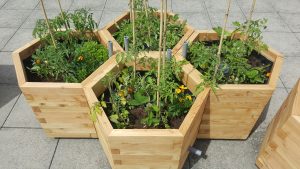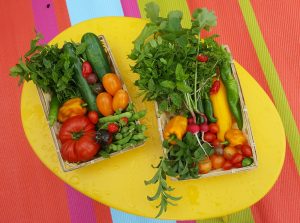Cueillette Urbaine, meaning « Urban gathering » in French, is a society commited to turn green the cities, by producing local organic food on the available buildings roofs.
Cueillette Urbaine also aims to associate local urban production and restoration in the same space, where customers could gather and choose their own fruits and vegetables to be cooked afterwards. Thus, it removes the environment costs of the transport, but it also enables to recycle organic food waste, to improve the biodiversity in the cities, to manage rainwaters, etc…
Cueillette Urbaine belongs to the new wave of urban farming. Nonetheless, growing out of the soil and creating new ecosystems in the core of the cities is a real urban challenge. Therefore, scientific research work is needed to develop new cultivation technologies, to assure a high quality production. Indeed, bringing soils from elsewhere is not a sustainable solution, as transport environmental costs could be higher than carrying food from the rural areas to the cities. Therefore, developing hydroponics, aquaponics or like Cueillette Urbaine new cultivate substrates is essential for sustainable food production in the cities. For instance, Cueillette Urbaine is leading a research and development project to evaluate the effects of different types of substrates (coffee ground, lawn cuts, compost…) on the plant growth. Secondly we focus our research on vegetal association benefice in particular to avoid diseases, ameliorate the pollination and finally to create an equilibrate ecosystem. Finally, we work on wicking systems to avoid hydric stress.
Besides, during the past 10 years, policy and science have worked in pairs in order to develop urban agriculture. There is a current need to define a proper institutional frame for urban agriculture, and this requires the collaborative research work of different types of scientists: geographers, economists, agronomists, urbanists, sociologists, etc. Cueillette Urbaine chooses to foster urban agriculture development by doing action-oriented research, which means combining research and practical work. Transforming practice into knowledge is also a way to close the gap between policies and urban farming by providing the policy makers information based on evidence. Thanks to these encouraging results and all the proved benefits of urban farming, city administrations pay increasing attention to urban agriculture development. For instance, Paris city aims at enhancing its urban food production area to 120 ha by 2020!
During many years urban agriculture has emerged as a fashion effect. Today, the massive use of chemical fertilizers and pesticides has made a lot of land infertile, in addition to that the expansion of cities causing the disappearance of arable land. We believe that a production of fruit and vegetables in the city will not replace the conventional agriculture but it is a necessity to supply local and fresh products to the city dwellers without any transport.
— By courtesy of Urban gathering compagny. Edited by Adrien Thurotte.
Contact: info@cueilletteurbaine.com
Website: www.cueilletteurbaine.com

